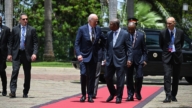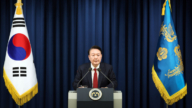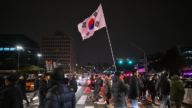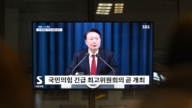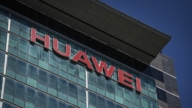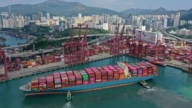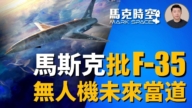【新唐人2011年12月9日訊】美中國防部第12次防務磋商12月7號在北京舉行,這是美國9月宣佈對台灣軍售,以及美軍加強在亞太地區部署後,中美軍方的首次接觸。外界分析,美國最近完成了爭奪亞太主導權的一系列戰略部署之後,美中軍方緊張關係降溫,減低了亞太地區發生軍事衝突的風險。
這次美中防務磋商,由美國國防部副部長弗盧努瓦(Michele Flournoy)和中共軍方副總參謀長馬曉天主持,主要是在擴大兩軍共識、管控風險、避免誤判。
《德國之聲》指出,這一雙邊會談如期舉行,顯示兩國都對維持安全合作關係十分重視。過去,美中防務磋商曾經多次被中方以各種原因單方面取消過。
英國《BBC》報導,美國副防長弗盧努瓦在會談中再次強調,美國在亞太地區的軍事部署不是為了圍堵中國。她指出,關於「美中衝突不可避免」的觀點是完全錯誤的。
近來,中共加速發展隱形戰機、航空母艦等高端武器,海軍艦艇多次穿越第一島鏈,在南中國海與菲律賓、越南等國頻頻發生主權爭端。
而美國的回應則是宣佈對臺軍售、外交政策重返亞洲、主張南中國海航行自由,與菲律賓、越南、韓國、日本等國聯合軍演,以及宣佈在澳洲駐軍,等等。中美在亞太地區摩擦日益加深,因此,這次美中防務磋商令外界關注。
就在前一天,中共中央軍委主席胡錦濤對海軍官員發表講話,要求加快推進海軍現代化轉型建設,拓展深化「軍事鬥爭準備」。
針對中共領導層這一罕見的強硬言論,美國五角大樓發言人利特勒(Georges Little)回應說:「中國有權發展其軍事力量。但美方希望北京當局在軍事問題上能夠透明。」
香港《東方日報》報導,長期關注中國海權、領土問題的全國政協委員劉夢熊透露,近來解放軍內部有一種聲音,以海軍能力不足作為中央在南海政策上軟弱的解釋。
他認為,胡錦濤的表態顯示中共在東海、南海等問題上,將由軟弱無力變成軟硬兼施。報導援引分析指出,中國與周邊國家經濟互動密切,一旦發生戰事勢必拖垮區內經濟。
紐約城市大學政治學教授夏明向《新唐人》表示,南海確有發生軍事衝突的可能。
夏明:「南海有點複雜在甚麼地方呢,因為南海有許多的國家在那邊攪在一起,有可能中國跟某一個國家,比如中國跟越南就有那些火拚,中國跟菲律賓也有那些衝突。所以,應該說,南海發生軍事衝突的可能性是非常大的。但是,問題是這個軍事衝突是否能夠上升到美國直接捲入跟中國進行衝突的這麼一個局面。」
美國副防長弗盧努瓦在7號的會談上表示,明年對於美中關係來說將是「意義重大」的一年,因此兩國在一系列重要問題上加強合作是非常重要的。這番話暗指兩國明年都面臨權力更迭:美國大選和中共十八大。
夏明教授認為,在這種情況下,中美都避免在亞太直接發生軍事衝突。
夏明:「因為中國它現在國內要擔心的問題實在太多,我不認為美國跟中國兩國都願意把這個危機變成一種武裝衝突。所以我覺得,可能有小的火拚、區域性的小規模衝突,但是不大會出現一個大規模的戰爭,這種前景至少目前還沒有可能。」
時事評論員文昭指出,儘管獨裁體制下,中共一直有可能利用戰爭來轉移國內矛盾,但也會導致中共內部權力格局的變數,加劇政治、經濟、社會危機,加速中共自身的崩潰。
新唐人記者常春、李元翰、 蕭宇採訪報導。
US-China Military Tensions Cool Down
The 12th US-China Defense Consultative Talks were held
in Beijing on December 7th.
The talks came after the U.S. announced its arms sales
to Taiwan, and its strengthening of military alliances in Asia.
Analysts say that after the recent U.S. deployments of
strategies to gain dominance in the Asia-Pacific regions,
the US-China military tensions have cooled down,
reducing the risk of military clashes.
The US-China Defense Consultative Talks covered issues
on how to expand common ground and various topics
such as managing and controlling risks
and avoiding miscalculations.
The bilateral talks were hosted by the U.S.
Under Secretary of Defense, Michèle Flournoy and the
Chinese Communist Party (CCP) Military’s
Deputy Chief of Staff, Ma Xiaotian.
German broadcaster Deutsche Welle says the
bilateral talks took place as scheduled,
a sign that both the U.S. and the Chinese regime
is taking security cooperation seriously.
The Chinese regime’s authorities are known to have
cancelled previous U.S.-China defense talks in the past.
The U.S. Under Secretary of Defense, Michèle Flournoy,
stressed that U.S. military deployments in the Asia Pacific region are not aiming at China, according to a BBC report.
Flournoy also pointed out that comments such as U.S-China
conflicts being inevitable are completely wrong.
Recently the Chinese regime has increased the development
of high-end weapons i.e. stealth fighters and aircraft carriers.
The regime has a history of disputes
with South China Sea countries
.i.e. Philippines and Vietnam, with its naval vessels
often breaking through the Pacific Ocean’s first island chain.
The U.S. in response strengthened its Return-to-Asia foreign
policy, calling for freedom of navigation in the South China Sea.
The U.S. sold arms to Taiwan, joined military drills with the
Philippines, Vietnam, Korea and Japan, and planned a military base in Australia.
The continued Sino-U.S. frictions has put Beijing’s
12th US-China Defense Talks center stage.
Just one day before the U.S-China defense talks, Hu Jintao,
the Central Military Commission Chairman,
asked the navy to speed up it’s modernization and
to prepare itself for warfare.
Georges Little, the U.S. Pentagon Press Secretary, said the
Chinese regime has “the right to develop its military power”
but they “repeatedly call for transparency from the Chinese".
The Hong Kong』s Oriental Daily reports that Liu Mengxiong,
member of the national committee of the Chinese Communist Party (CCP),
claims an insider of the People’s Liberation Army says the
Chinese regime is using its inferior naval capacity as an excuse for the regime’s weak South China Sea policies.
Liu Mengxiong says Hu Jintao’s remarks may be showing
signs that the Chinese regime could adopt a carrot and stick policy on East and South China Sea issues.
Analysts say that due to tight economic interactions between
China and neighboring countries, the regional economies would suffer greatly in the event of a war.
But other analysts do believe in a possible military conflict in
the South China Sea, as explains Xia Ming, a City University of New York Professor.
Xia Ming: “The South China Sea situation is a bit complicated,
as the region involves so many neighboring countries.
There is is possibility of conflict between China and
another nation, like Vietnam or the Philippines.
So I think there’s a great chance the South China Sea
will get into military conflicts.
But the question is whether the U.S. would directly
get involved and confront China.”
The U.S. Under Secretary of Defense said during the talks
that 2012 would be a “significant" year for US-China relations.
The U.S. will held its presidential elections and the Chinese
Communist Party (CCP) its 18th Congress.
Therefore it was important for both sides to strengthen
cooperation on a range of issues says Michèle Flournoy.
Professor Xia Ming added that in this context, both sides
should avoid a direct military conflict in the Asia Pacific.
Xia Ming: “Since in China, the Chinese authorities are loaded
with so many problems to worry about,
I do not think both countries are willing to evolve this crisis
into an armed conflict.
So small or regional conflicts seem more likely than greater
power conflicts. “
Commentator Wen Zhao points out, that although the
Chinese regime has the potential to divert attention from
its domestic troubles by initiating warfare overseas,
its trick can also give rise to a pattern of power within the Chinese Communist Party (CCP).
This variable would intensify crises in politics, economy
and society, accelerating the collapse of the regime itself.
NTD reporters Chang Chun, Li Yuanhan and Xiao Yu


